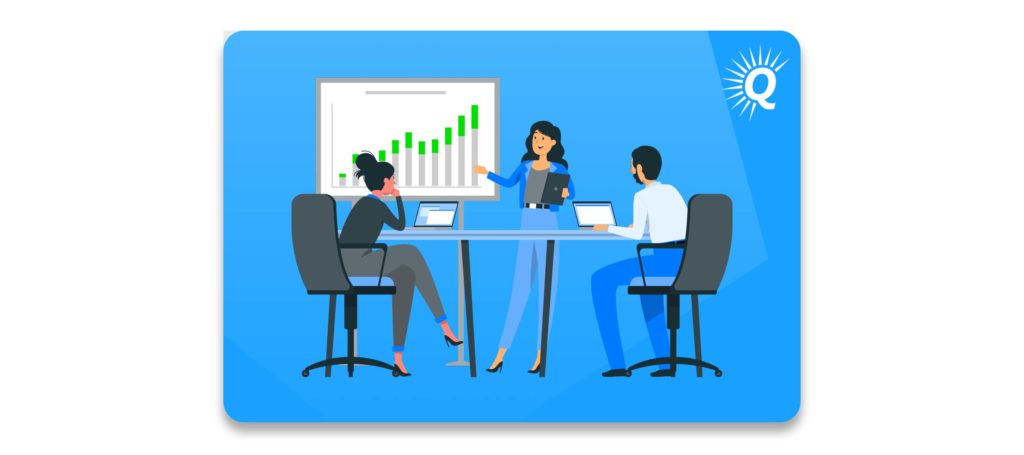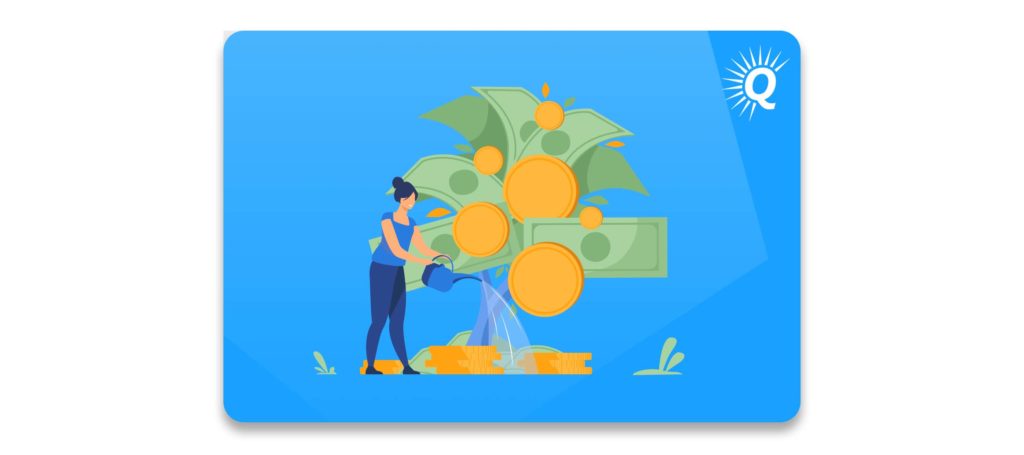Topics:
Never Miss a Beat - Get Updates Direct to Your Inbox
FILTER:


Tips for Growing Business Value
By Quiet Light
As an entrepreneur, growing business value is an important aspect of maximizing your success. Growing the value of your business brings both immediate financial and practical benefits, as well as long-term rewards. In the short run, this includes owning a more profitable and stable business. When it comes time to sell, more value translates into receiving a higher purchase price and better deal terms. As such, it is important to know the ins and outs of creating growth.
In this article we will discuss:
- What makes a company valuable
- Understanding the value of your business
- Ways to increase the value of your business
- How to calculate the value of your business


What Makes a Company Valuable
The SDE Multiple Method is the most widely used method for valuing most online businesses. We will discuss this in more detail later on.
Valuation metrics are crucial for determining the expected value of a business and growing business value. However, there are four general factors at play that help determine the overall value of a business. We refer to these as the Four Pillars of Value. These include:
- Growth
- Risk
- Transferability
- Documentation
Growth
Whether you run a small business or a larger business, one of the most telling aspects of a business’s value is the past and current growth patterns of the company. Additionally, the future growth prospects also weigh heavily on the perceived value of the company.
Not surprisingly, a person or organization purchasing a company is seeking to realize a healthy return on their investment. One of the quickest and surest ways of doing so is to purchase a company that will grow substantially after purchase. By looking at the past and current growth of a business, one can gain a picture of what can likely be expected in the future.
Thinking of Selling Your Business?
Get a free, individually-tailored valuation and business-readiness assessment. Sell when you're ready. Not a minute before.
All other things being equal, strong growth leads to a higher sales price for a company. In addition, having clear opportunities for future growth also help with growing business value.
The growth of your company is not the only growth metric to pay attention to. If your sector or industry is growing as a whole, this will also help drive up the value of your business, and vice versa.
“Some of the most telling aspects of a business’s expected value are the past and current growth patterns of the company.”
Risk
While strong business growth has a positive influence on the value of your business, risk does the opposite. The more risky a business is perceived to be, the less value it will have, all other factors being equal.


When making an investment, the potential upside is measured against the potential for failure. As such, if your business carries with it a large amount of risk, potential buyers will be less likely to want to purchase it.
While all business ventures inherently carry some level of risk, there are several factors that can make a business more or less risky. For starters, any aspect of your business that relies on a single point of failure incurs more risk. For example, if you only have one product, your business could suffer a steep and sudden decline if anything were to happen to that one product.
The age of your business is another factor that influences perceived risk. In general, the longer a business has been around, the less risky it is. Start-ups and other new businesses are often riskier than a company that has a proven track record over the course of the past 10 years.
“The more risky a business is perceived to be, the less value it will have, all other factors being equal.”
Transferability
Your business must also be able to be successfully transferred to a new owner in order for it to be attractive to prospective buyers. There are several factors that could impact the transferability of a business. Improving any of these can help with growing business value.
For one, let’s say you run a company that is dependent on your personality or image. In this situation, it may be hard for someone to take over ownership without negatively impacting performance. Likewise, if your company requires a very specific certification or knowledge base, it will make it harder to find a qualified buyer.


The way you run your company has an impact on how easy it is to transfer ownership. If you run a disorganized operation with no clear structure or operating procedures, you will make it much harder for a new owner to take the reins, thus decreasing business worth.
Documentation
Having clear and concise documentation will also lead to a higher valuation. By creating orderly financial records, you make it easier for a potential buyer to verify the performance of your business, which in turn creates trust and confidence.
Clear documentation regarding your standard operating procedures and organizational structure will make it easier for a new owner to successfully run your company. It will also help instill a level of professionalism into your business—an attractive quality for the right buyer that can help grow business value.
Understanding the Value of Your Business
Increasing the value of your online business is about much more than generating additional profit. By understanding what factors are important for growing business value and optimizing for these factors, you will bring about a range of positive benefits for the current and future performance of your business.


Increase efficiency
A well-run business is a valuable business. By focusing on creating clear documentation and standard operating procedures, you will help to increase the operational efficiency of your business. Failing to do so will lead to a devaluation of your business.
Buy a Profitable Online Business
Outsmart the startup game and check out our listings. You can request a summary on any business without any further obligation.
In addition to growing business value, this will also save you time and energy while you are still the owner. Instead of focusing your efforts on day-to-day responsibilities and putting out fires, you can focus on activities that drive growth.
“A well-run business is a valuable business.”
Create stability
A well-organized business is also more stable. With the right systems in place, you will be better able to anticipate changes and adapt proactively. By focusing on creating stability in your operations and income, you will help increase the value of your business for a potential future sale.
Maximize current income
Perhaps the most obvious benefit of increasing the value of your business is the increased revenue and profit that will come as a result of your efforts. As you grow your business business, your income will grow accordingly.
Sell for a higher price
In addition to increasing your current revenue and income, creating a more valuable business will lead to a higher sale price if you do eventually decide to sell your business.
Ways to Increase the Value of Your Business
Let’s take a look at specific things you can do to increase the value of your business.
Sell during a period of strong growth
As we have seen, strong growth is one of the most important drivers for company value. As such, it is important to sell your business during a period of sustained growth in order to maximize your sale price.


When thinking about selling during a period of growth, be sure to take into account seasonal fluctuations. For example, many businesses exhibit strong growth during the lead-up to the holiday season and experience a strong decline in sales immediately following.
At times, however, life circumstances may force you to sell outside of a strong growth period. For example, if you really need cash to make a down payment on your dream home but your business has been in decline, you may not have the time to increase growth prior to selling.
Minimize risk
By going through your business operations and minimizing or eliminating risk whenever possible, you will help to maximize the value of your business.
Remember, any aspect of your business that relies on a single point of failure inherently carries more risk. For instance, if you rely solely on social media marketing for your growth strategy, you may see a sharp decline in sales if that channel takes a large hit. In order to remedy this, you could diversify your marketing efforts to include content marketing, paid advertising, affiliate marketing, and more.
Likewise, if you currently only sell one product, your sales could take a significant hit if you experience an issue with that product. Supply chain issues, copyright infringement issues, and other problems could instantaneously shut down your business.


To address this, consider adding additional products and product lines. In addition to increasing customer value, this will help keep your business thriving even if one product goes down.
“By going through your business operations and minimizing or eliminating risk whenever possible, you will help to maximize the value of your business.”
Increase transferability
Consider how easy it would be for a new owner to take over your business successfully. Does your business depend on your personality or personal image? Does it require a specific license or skill set to run?
If so, work to remove these barriers. If you run a travel blog that features your personal travel stories, for example, work to change the focus to location guides, crowd-sourced travel stories, and travel gear reviews.
In addition, make sure your operations are streamlined and automated as much as possible. This will make it much easier for a new owner to take over the operations of your business, thus increasing the amount of money that a potential buyer will be willing to pay.
Improve documentation
Lastly, make sure that you have clear and accurate documentation. This includes orderly financial statements as well as clear standard operating procedures.


By creating consistent documentation, prospective buyers will be better able to verify your business’s performance prior to purchasing, which will help instill confidence. In addition, standard operating procedures will make it much easier for a new owner to successfully run your company once they have taken over ownership.
Both of these factors make your business much more attractive to potential buyers and help grow business value.
“By creating consistent documentation, prospective buyers will be better able to verify your business’s performance prior to purchasing, which will help instill confidence.”
How to Calculate the Value of a Business
There are several different methods for business valuation, but the most common is the SDE Multiple Method.
In this section, we will discuss the SDE Multiple Method, and then break down both the SDE and the multiple a little bit further.
SDE Multiple Method
According to the SDE multiple method for company valuation, the value of a business = SDE x Multiple.


SDE stands for seller’s discretionary earnings. The multiple is simply a number that the SDE is multiplied by in order to arrive at the total value for the company.
When doing business valuation based on the SDE Multiple Method, it is important to distinguish the multiple from a profit multiplier. The profit multiplier is utilized when using profit in place of SDE.
Understanding SDE
The seller’s discretionary earnings is the total benefit the business owner derives from the company. It includes the net income of the business plus certain discretionary expenses that can be added back.
These expenses are often travel expenses, one-time purchases, home-office expenses, and other expenses that are not necessarily required for the business’s operations. Essentially, they are expenses that a new owner would not necessarily need to incur.
The SDE is used in place of net income because it does a better job of describing the total money-generating capacity of the business. Thus, different businesses can be more accurately compared to each other.
“The seller’s discretionary earnings is the total benefit that the owner derives from the business.”
What determines the multiple?
The multiple will vary from business to business. The higher it is, the more valuable the business will be. Both objective and subjective factors will play into determining the exact multiple number. Things like clear documentation, easy transferability, and strong growth will all drive up the multiple value.


Aside from these factors, the multiple may vary depending on the business model. For example, a website value, Amazon FBA business value, or SaaS business value may all be different even if SDE is the same for all three companies.
In addition, other factors such as intellectual property may influence the multiple.
There are many factors that go into determining the right multiple for your specific business. By working with a qualified Advisor, you can help maximize the potential value of your company while remaining realistic about what you can ultimately expect to receive.
Thinking of Selling Your Business?
Get a free, individually-tailored valuation and business-readiness assessment. Sell when you're ready. Not a minute before.





